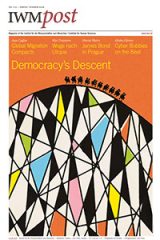

In collaboration with
Institute for Human Sciences
The Institute for Human Sciences / Institut für die Wissenschaften vom Menschen (IWM) is an independent institute for advanced study in the humanities and social sciences. Since its foundation in 1982, it has hosted more than 1500 scholars, journalists and translators from all over the world. Many of the Institute’s Permanent and Visiting Fellows are regular contributors to Eurozine or its focal points The World in Pieces and Ukraine in European Dialogue (see below).
Website: www.iwm.at
X (formerly known as Twitter): https://x.com/iwm_vienna
Youtube: https://www.youtube.com/channel/UCIwFQ_iRX8w8D0NKJo41Ihw

Articles

Of viruses and men
The dangerous pandemic in the social sciences
COVID-19 found societies not only unprepared but also unaware. Koray Caliskan and Donald MacKenzie ask why social sciences have taken so little interest in pathogens. In comparing humans and viruses, they reveal the risks of an overly anthropocentric focus. Perhaps it’s time to rewrite the books?

Gone viral
COVID-19 in the disinformation ecosystem
From genocidal accusations to alleged cures, the coronavirus pandemic is accompanied by a swathe of conspiracy theories. These are perpetrated not only by clickbait websites but also authoritarian regimes who exploit the scare for political purposes and try to shift the blame from their failing responses. An international survey and a detailed case study.

Control groups
An interview with William Davies on politics in an age of sensation
The classic liberal distinction between war and peace has expired. Markets have learnt the lesson that gut reactions matter, but political institutions of liberal democracy are still lagging behind. What we need is a politics of empathy, William Davies argues.

Made in the EU
Why workers are fleeing Romania’s garment industry
‘Sweatshops’ are usually associated with labour outsourced to east- and south-east Asia, but they exist inside the EU too. Gruelling working conditions in Romania’s low-pay garment industry, which supplies clothes for mid-market and luxury retailers alike, force many people to go abroad in search of a real living wage.
Focal points

Inspired by a lecture that Clifford Geertz delivered in 1995 at the Institute for Human Sciences in Vienna, this focal point engages with ‘deep diversity’, ‘a sense of dispersion, of particularity, of complexity and of uncenteredness’ rather than unified world order. It follows the launch of a research programme of the same name at the institute in January 2023.

Post-revolutionary Ukrainian society displays a unique mix of hope, enthusiasm, social creativity, collective trauma of war, radicalism and disillusionment. With the Maidan becoming history, the focal point ‘Ukraine in European Dialogue’ explores the new challenges facing the young democracy, its place in Europe, and the lessons it might offer for the future of the European project.
Projects and publications

